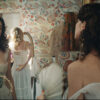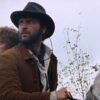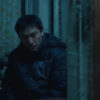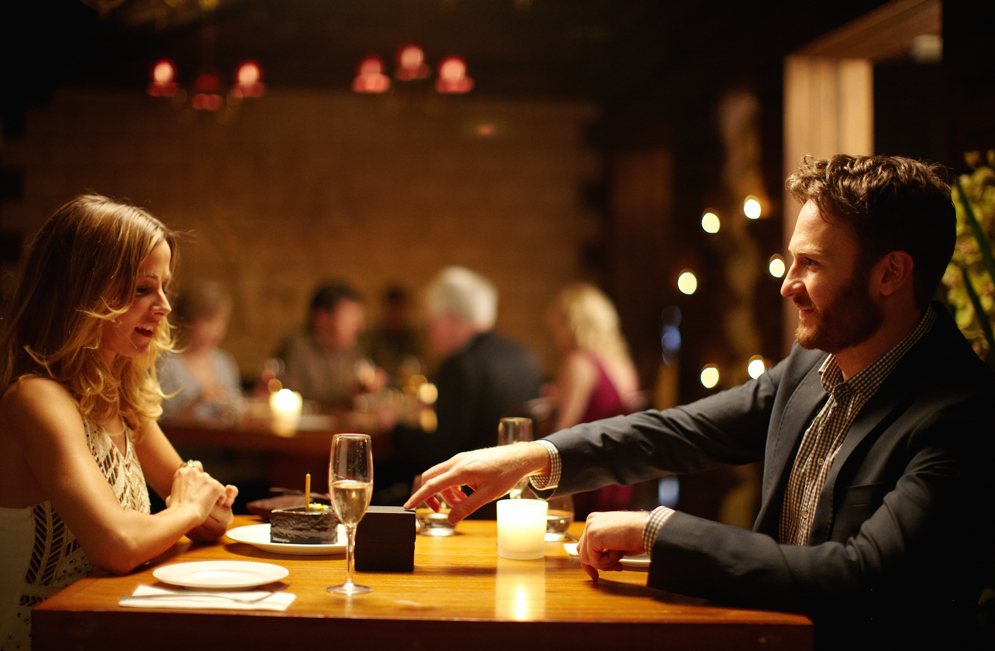In introducing his feature debut “The Little Death” at the Toronto Film Festival last fall, Josh Lawson made some of the Canadian crowd blush by offering up a statistic found in the considerable research he did for his sex comedy, noting a surprising 8% of the country enjoyed doing it in a canoe. When TIFF programmer Jane Schoettle, who was standing right beside Lawson, sheepishly (and likely sarcastically) raised her hand, the first-time writer/director grinned, “You are just the right amount of kinky for this film.”
But by recontextualizing certain sexual proclivities and curiosities within the context of a lighthearted romantic comedy, Lawson removes some of the stigma attached to them and in turn, creates something unusually touching, in all matter of senses, with “The Little Death,” where obstacles to long, everlasting love are not created by distance or wandering eyes, but just how attentive one is willing to be to their partner’s needs. Telling the stories of five couples at varying stages of their relationships, the film shows each gingerly negotiating how to keep their personal needs satisfied while accommodating the unusual proclivities of their partner, whether that’s being around by crying, watching someone sleep or being dominated.
Lawson clearly revels in all the awkwardness that ensues, though under the veil of a raucous comedy, he addresses the day-to-day work that goes into a longterm relationship in a direct way that few films do while having a lot of fun in the process. Perhaps best known Stateside for his role in Showtime’s “House of Lies,” the Australian multi hyphenate also makes the most of a terrific cast that includes Bojana Novakovic, Kate Box, Alan Dukes, Patrick Brammall, Damon Herriman and Kate Mulvany. Following a worldwide tour, “The Little Death” finally arrives in America this week and Lawson was recently in Los Angeles to talk about the project he devoted eight years of his life to, the challenges of creating an anthology film and being able to let go and make something else.

Sex is an interesting subject, and relationships are kind of an endlessly fascinating subject because we all have them, so it’s great fodder for film because it’s something that we can all relate to. We all want to have sex, and we all want to be in love. We all want the perfect relationship, and we all have complicated relationships, so why not something that explores all that stuff? The fetish angle was an interesting angle because it felt fresh to me. I would find a fetish and then would go, “Well, what would be an interesting problem to have with this fetish?”
How far down the rabbit hole did you go with the research? It seems endless.
Too far and yet not even as far as anyone could go. I spent lots of months over the years researching this stuff, talking to people and going to sex clubs and talking to fetishists and really find out how complicated it is and the potential hazards of having a fetish that your partner may not be into. How do you even tell that to your partner? There was no end to the conflict that I could come up with. The most Googled word on the internet is sex, so there’s definitely a lot you can find on that.
How did these – sexual masochism, somnophilia, role play fetishism, dacryphilia and telephone scatalogia — become the five fetishes you focused on?
I needed a few guidelines. One was that I didn’t want anyone to cheat on their partner with anyone else. I wanted them to stay within the confines of monogamy, and I needed fetishes that required planning and some forethought. For instance, if you like spanking, that’s something you can do in the spur of the moment, but if you get off on watching someone cry, well, it’s not like you can go, “Cry. Cry now.” You need a bit of finesse in order to achieve what it is you want. If you want to make a dirty phone call, that’s something you can do in the spur of the moment too, unless you’re deaf, and that requires a negotiation. That’s conflict. That’s drama, and that’s comedy, so the more conflict and obstacles I could put in their way, the funnier and the more dramatic it would be for me.

Sometimes you don’t need extra obstacles because relationships are complicated enough, but for this, I felt like they were love stories. Infidelity would have broken the theme of the film, so it would have taken us out of the film, and it would have been difficult to root for people in the film if they were being mean to their partners. The [characters] do a lot of things that are misguided and make poor decisions, but it’s never to deliberately be mean to the other person. It’s only always to try and get closer to the other person, even though, as we can see, the dramatic irony is that we know that’s a bad decision, but they don’t. They go, “Well, if I lie about this, it might mean that we can get closer together. Oh, God, that didn’t work. I’ll lie about this to get rid of that lie, but it’s only to try and get closer again.” We can accept that, even though we’re watching through our fingers going, “Don’t do that. That’s so dumb,” but we can at least get on board with them because their motivations are pure.
Visually, the film feels so warm, yet if you actually listen to what they’re saying, they go to some really, really dark places. Did you feel like you could get away with more as a result?
That was deliberate because the biggest comedy lives in warmth, so lots of scenes happen during the day. We wanted that warm tone and the soundtrack and score lightened things up, partly because once it goes too heavy, it’s tough to get momentum back again for the audience. It was always important to dip them into the depths for a bit, but not plunge them into the depths and all those elements helped.

Yes and no, only inasmuch as I feel like I was trying to approach it from an audience member with my own sensibilities. It’s a bit of a fool’s errand to say, “I know what audiences like. I’ll make this,” because no one really does. Audiences are a tricky beast, and they’re all different. But we did test screenings throughout the post-production, and that was a great eye-opener to understand what audiences were responding to and what they weren’t. There were some jokes that I loved that I cut out because no audience loved them. I was like, “Well, it doesn’t matter if I love them. If no one’s responding to them, cut them.” I definitely wanted to make a film that could appeal to a wide array of people and obviously, I do like a lot of films, but I hope that I have a slightly commercial bent in my filmmaking.
I’ve read that you would often go back and rewrite scenes on the fly or after a day of shooting. As an actor yourself, did you let actors into your process as a writer/director?
Oh, they had to be because I was often calling them, going, “Hey, I’m going to e-mail you a new scene that we’re shooting tomorrow. Sorry.” But the rewriting happened on my own, just because I wouldn’t burden the actors with that responsibility. There were just things that didn’t go our way, and more often than once — probably three or four times — I did have to add a new scene on the fly in a schedule that just didn’t allow it. We had to be really inventive with how fast and economical we could shoot these new scenes.
Were creating short stories a nice way to ease you into directing a feature?
There might be an argument that there’s a higher degree of difficulty being able to juggle five different stories, as opposed to one, but basically any feature is its own beast. There are problems with an anthological film that you don’t get with a single narrative and there are certain things that are easier. Getting all those actors together on one project was like herding cats. It’s actually sometimes tougher to go like, “How do we get all these actors together in this three-way block? This is so tough.” But ultimately, all the planets aligned, and we got what we wanted. My next film probably won’t be anthological, just because I feel like I’ve scratched that itch, though in time, I would probably entertain the idea of doing a “Little Death” sequel. I would love to see what happens next, maybe with new characters, maybe with similar characters. I don’t know, but that won’t be for a little bit.

Yes is the short and easy and truthful answer, but what that is specifically might be a little hard to tell you because I’m not sure I know myself. It was just mirroring and parroting some of the directors that I’ve worked with over the years who I really deeply respect. For instance, Adam McKay has a great gift of allowing the actors to try new things on set and you’re able to catch a few moments of gold, so that might be something I borrowed from him because I certainly allowed my actors to do the same thing. But there are lots. I worked with Jay Roach, who I think is one of my favorite directors that I’ve worked with, Stephen Hopkins, who did “House of Lies,” Charlie de Lauzirika, who I did “Crave” with, and Darren Grodsky and Danny Jacobs — I learned a lot from all of them, just how to make the most of a tight budget and a tight schedule.
You’ve said that part of the appeal of doing a film comprised of vignettes is that you can appeal to a different part of the audience with each story, so what’s it been like to see the reaction.
It was more that they were representative of a different time in a relationship and that was just naturally going to appeal to different members of the audience. But [the reaction has] been awesome. There’s nothing more rewarding to me than watching this with a crowd because that’s why I did it, is to give people laughter and moments of shock and surprise and moments of drama. When I can see the audience respond that way, I just know that we did something wonderful and I do find that people respond to different things, but that’s the beauty of a film.

Now that it’s getting released here in the States, I feel finally like I can let go of it. It’s been released all over the world and that’s a really nice feeling, because for the longest time, I haven’t been able to let go of it. It’s been my baby, but now, finally, I feel very ready to say goodbye and I’m ready to move on to the next thing. Every time I would try to write the next thing, there was just not enough room in my brain because “The Little Death” took up so much space. But now I’ve emptied “The Little Death” from my head, and it’s allowing all these great new ideas to come in and new stories to be told. Even though I wish I’d probably had another script ready to go, I’m not sure my body would have allowed it. Sometimes, as a writer, you just have to trust what your body tells you. My mind now is saying, “Now’s the time.” I just have to listen to that and hopefully find inspiration where it comes.
“The Little Death” opens on June 26th in Los Angeles at the Sundance Sunset Cinemas and New York at the Sunshine Cinemas. It will expand theatrically in the coming weeks and is now available on VOD. A full list of theaters and dates is here.




